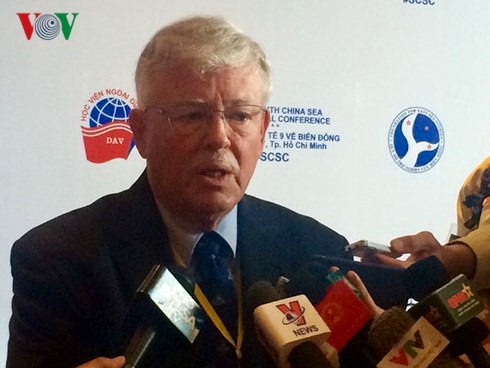(VOVWORLD) - An international conference in Ho Chi Minh City has called for comprehensive, lasting, and sustainable solutions and trust building to turn the East Sea into an area of peace, stability, and development. VOV correspondent Huy Son reports on the outcomes of the 9th international conference on the East Sea.
Themed "Cooperation for regional security and development," the 2-day conference concluded on Wednesday in Ho Chi Minh City with candid, unbiased, and scientific principles.
Potential threats
Participants said no severe turbulence in the East Sea was reported this year. Since the ruling the of Permanent Court of Arbitration (PCA) on the Philippine lawsuit against China’s territorial claims, the East Sea has seen positive changes with a decline in the number of clashes.
But countries’ different viewpoints and perceptions of history and international law remain a major obstacle and a potential threat to peace, security, safety, and stability in the East Sea. In addition, some non-traditional security challenges have emerged. Asia-Pacific has the highest growth of defense spending, which hit 450 billion USD last year, 4.5% higher in the previous year. Former Deputy Foreign Minister Le Cong Phung voiced his concern: “Stronger defense capability of involved parties and cooperation among partners on the one hand helps countries safeguard their interests, but on the other hand may heat up economic and military strategic competition.”
Strategic trust consolidated
Participants emphasized comprehensive, lasting, and sustainable solutions to prevent the East Sea from getting bogged down in disorder and conflicts and from threatening the regional “security ecosystem.”
Prof. Dr. Pham Quang Minh, Rector of the University of Social Sciences and Humanity, said the recent framework agreement on the Code of Conduct of Parties in the East Sea (COC) between ASEAN and China marked a step forward in reducing tensions in the region. But he said it will take time for COC to become an effective legal tool, depending largely on the political will of involved parties.
 Prof. Carlyle Thayer of New South Wales University’s Australian Defense Force Academy Prof. Carlyle Thayer of New South Wales University’s Australian Defense Force Academy |
Prof. Carlyle Thayer of New South Wales University’s Australian Defense Force Academy, a well-known East Sea expert, said claimants need to consolidate their strategic trust to create a common perception on maintaining peace, security, and stability. He said “I expect for lowering tensions as ASEAN and China began to negotiate a code of conduct. Your economic development and success depend largely on peace in the South China Sea (East Sea). Whether it’s a long-term future or intermediate future, it’s on ASEAN and China’s commencement of negotiating a legally binding code of conduct.”
Vietnam, a member of ASEAN and a country with direct East Sea interests, has pursued a foreign policy of multilateralization, diversification, and combination of cooperation and resistance. Vietnam has sought international support in settling conflicts via peaceful means and international law. The policy was reflected in the just-concluded conference to achieve the ultimate goal of cooperation and co-development in the East Sea.